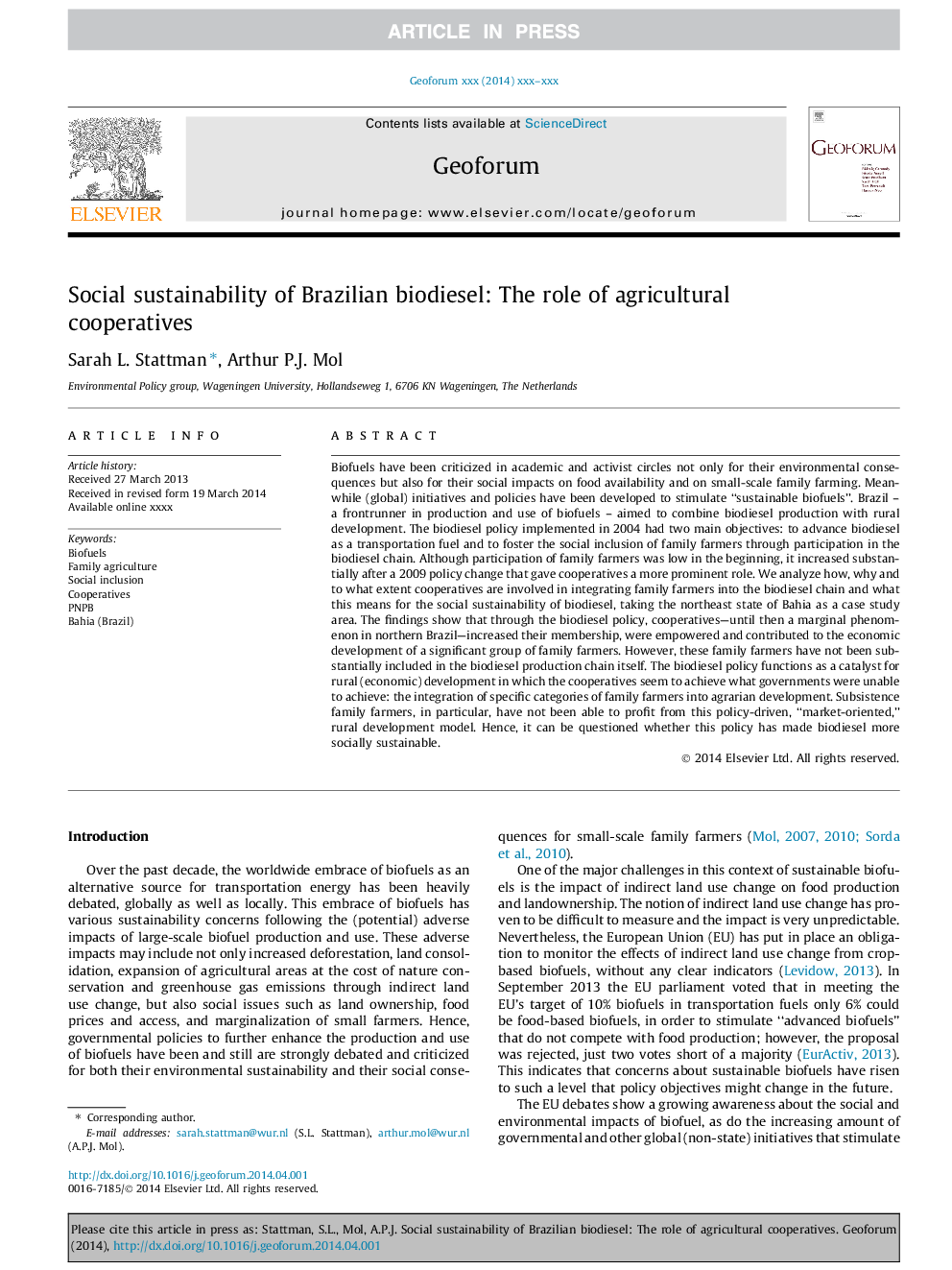| کد مقاله | کد نشریه | سال انتشار | مقاله انگلیسی | نسخه تمام متن |
|---|---|---|---|---|
| 5074028 | 1477135 | 2014 | 13 صفحه PDF | دانلود رایگان |
عنوان انگلیسی مقاله ISI
Social sustainability of Brazilian biodiesel: The role of agricultural cooperatives
ترجمه فارسی عنوان
پایداری اجتماعی بیودیزل برزیل: نقش تعاونی های کشاورزی
دانلود مقاله + سفارش ترجمه
دانلود مقاله ISI انگلیسی
رایگان برای ایرانیان
کلمات کلیدی
ترجمه چکیده
سوخت های زیستی در محافل علمی و فعال نه تنها برای پیامدهای زیست محیطی خود بلکه برای تأثیر اجتماعی آنها بر روی دسترسی به مواد غذایی و کشاورزی کم خانواده مورد انتقاد قرار گرفته اند. در همین حال (ابتکار) و سیاست ها (جهانی) برای تحریک بیولوژیکی پایدار ساخته شده است. برزیل - پیشگام در تولید و استفاده از سوخت های زیستی - با هدف ترکیب تولید بیودیزل با توسعه روستایی است. خط مشی بیودیزل که در سال 2004 اجرا شد، دو هدف اصلی داشت: پیشبرد بیودیزل به عنوان سوخت حمل و نقل و تقویت حضور اجتماعی کشاورزان خانواده از طریق مشارکت در زنجیره بیولوژیکی زیست محیطی. با وجودی که مشارکت کشاورزان خانواده در ابتدا کم بود، پس از تغییر سیاست سال 2009، به طور قابل ملاحظهای افزایش یافت که تعاونیها نقش برجستهتری داشتند. ما تجزیه و تحلیل کنیم که چرا و چه میزان تعاونیها در ادغام کشاورزان خانوادگی در زنجیره بیولوژیکی زیست محیطی دخالت دارند و این بدان معنی است که برای پایداری اجتماعی بیودیزل، با توجه به وضعیت شمال شرقی بهیه به عنوان منطقه مورد مطالعه، مورد بررسی قرار می گیرد. یافته های این تحقیق نشان می دهد که از طریق سیاست بیودیزل، تعاونی ها - تا آن زمان یک پدیده حاشیه ای در شمال برزیل - عضویتشان را افزایش دادند و به توسعه اقتصادی بخش قابل توجهی از کشاورزان خانواده کمک می کردند. با این حال، این کشاورزان خانواده به طور قابل توجهی در زنجیره تولید بیودیزل خود شامل نشده است. سیاست بیودیزل به عنوان یک کاتالیزور برای توسعه روستایی (اقتصادی) عمل می کند که به نظر می رسد تعاونی ها به آنچه دولت ها قادر به دستیابی به آن نمی شوند، دست یابند: ادغام دسته های خاص کشاورزان خانوادگی در توسعه زراعتی. به طور خاص، کشاورزان خانوادگی، به طور خاص، نمی توانستند از این سیاست گرا، یک بازار محور، یا یک؟ مدل توسعه روستایی. از این رو، می تواند مورد سوال قرار گیرد که آیا این سیاست بیولوژیست را به طور اجتماعی پایدار ساخته است.
موضوعات مرتبط
علوم انسانی و اجتماعی
اقتصاد، اقتصادسنجی و امور مالی
اقتصاد و اقتصادسنجی
چکیده انگلیسی
Biofuels have been criticized in academic and activist circles not only for their environmental consequences but also for their social impacts on food availability and on small-scale family farming. Meanwhile (global) initiatives and policies have been developed to stimulate “sustainable biofuels”. Brazil - a frontrunner in production and use of biofuels - aimed to combine biodiesel production with rural development. The biodiesel policy implemented in 2004 had two main objectives: to advance biodiesel as a transportation fuel and to foster the social inclusion of family farmers through participation in the biodiesel chain. Although participation of family farmers was low in the beginning, it increased substantially after a 2009 policy change that gave cooperatives a more prominent role. We analyze how, why and to what extent cooperatives are involved in integrating family farmers into the biodiesel chain and what this means for the social sustainability of biodiesel, taking the northeast state of Bahia as a case study area. The findings show that through the biodiesel policy, cooperatives-until then a marginal phenomenon in northern Brazil-increased their membership, were empowered and contributed to the economic development of a significant group of family farmers. However, these family farmers have not been substantially included in the biodiesel production chain itself. The biodiesel policy functions as a catalyst for rural (economic) development in which the cooperatives seem to achieve what governments were unable to achieve: the integration of specific categories of family farmers into agrarian development. Subsistence family farmers, in particular, have not been able to profit from this policy-driven, “market-oriented,” rural development model. Hence, it can be questioned whether this policy has made biodiesel more socially sustainable.
ناشر
Database: Elsevier - ScienceDirect (ساینس دایرکت)
Journal: Geoforum - Volume 54, July 2014, Pages 282-294
Journal: Geoforum - Volume 54, July 2014, Pages 282-294
نویسندگان
Sarah L. Stattman, Arthur P.J. Mol,
